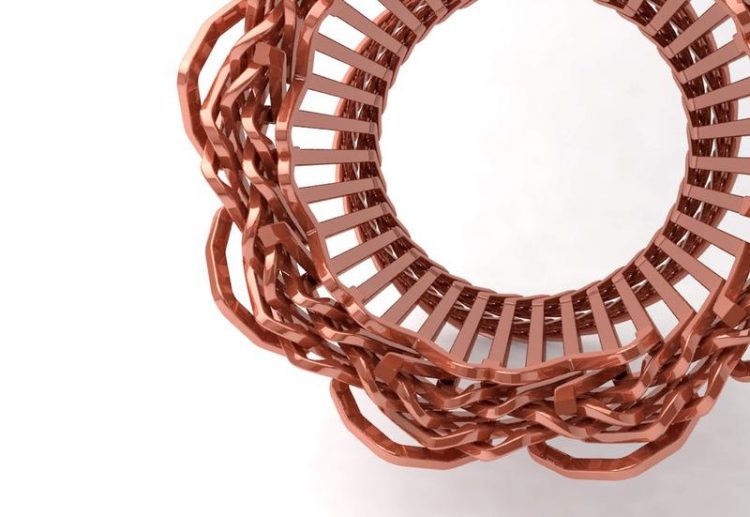More powerful electric motors with 3D printing: EXIST research transfer from TU Freiberg pushes additive manufacturing

The technology: additively manufactured Hairpin traction motor. Additive Drives
“We are rethinking the electric motor,” explains Philipp Arnold. “The drive tasks of the future – whether in industry or traffic – place high demands on the individual components. Classical manufacturing processes for electric motors quickly reach their limits here.
Manufacturing the copper coils using 3D printing solves this problem. The operationally optimal geometry of the additive components enables a performance increase of up to 45 percent,” says Arnold. The graduate industrial engineer is one of the four spin-offs.
Together with Axel Helm, Dr. Jakob Jung and Lasse Berling (alumnus of the TU Freiberg), he wants to establish the additive production of copper coils, the main component of every electric motor, on the market within the next year and further develop the technology.
The turbo for the development process
The traditional production of prototypes for electric motors takes up to seven months. This is due to complex winding tools that have to be manufactured and set up. In contrast, the copper 3D printing process requires no additional tools and reduces the production time to a few days.
This makes significantly faster test cycles and market-readiness processes possible. In cooperation with a manufacturing network, complete electric motors are thus produced in a short time.
No reduction in material parameters
The selective laser melting production process used for this purpose is optimized for the application, as is the copper raw material. “We achieve an electrical conductivity of 100% according to the International Annealed Copper Standard (IACS)”, explains co-founder Axel Helm.
As a specialist in additive manufacturing, he has brought the 3D printing process to maturity through years of research work. Laser melting also guarantees an extremely strong cohesion of the components. All material properties, from thermal conductivity to clamping force, are therefore in no way inferior to classic metal components made of cast steel, aluminum or copper.
The spin-off is supported by an EXIST research transfer at the Chair of Additive Manufacturing of Prof. Dr. Henning Zeidler of the TU Bergakademie Freiberg.
“With the EXIST Research Transfer, the BMWi and TU Bergakademie Freiberg have created an essential basis for these high-potential spin-offs to develop their products to market maturity and establish themselves in a rapidly growing market,” explains Andre Uhlmann from the SAXEED start-up network at TU Bergakademie Freiberg, which has been supporting the Additive Drives team in the first funding phase since March.
Philipp Arnold; Phone: +49 1733063061919; E-Mail: philipp.arnold@additive-drives.de
Media Contact
More Information:
http://www.tu-freiberg.de/All latest news from the category: Machine Engineering
Machine engineering is one of Germany’s key industries. The importance of this segment has led to the creation of new university degree programs in fields such as production and logistics, process engineering, vehicle/automotive engineering, production engineering and aerospace engineering among others.
innovations-report offers informative reports and articles covering technologies such as automation, motion, power train, energy, conveyor, plastics, lightweight construction, logistics/warehousing, measurement systems, machine tools and control engineering.
Newest articles

Pinpointing hydrogen isotopes in titanium hydride nanofilms
Although it is the smallest and lightest atom, hydrogen can have a big impact by infiltrating other materials and affecting their properties, such as superconductivity and metal-insulator-transitions. Now, researchers from…

A new way of entangling light and sound
For a wide variety of emerging quantum technologies, such as secure quantum communications and quantum computing, quantum entanglement is a prerequisite. Scientists at the Max-Planck-Institute for the Science of Light…

Telescope for NASA’s Roman Mission complete, delivered to Goddard
NASA’s Nancy Grace Roman Space Telescope is one giant step closer to unlocking the mysteries of the universe. The mission has now received its final major delivery: the Optical Telescope…



